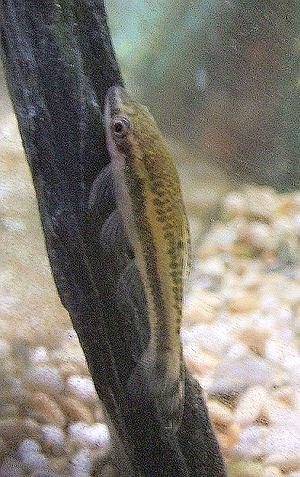Category:Otocinclus
![]() Please copy and paste ' [[Category:Otocinclus]] ' into the end of your article to include it in this category.
Please copy and paste ' [[Category:Otocinclus]] ' into the end of your article to include it in this category.
| Contents | Top · 0-9 · A B C D E F G H I J K L M N O P Q R S T U V W X Y Z |
|---|
Contents
About Otocinclus
Otocinclus or Otos for short, are a small non-aggressive algae eating catfish about 3-5cm (1.2-2") long.
Alternative names
Dwarf Oto, Dwarf Suckers. Pronounced "auto SINK luss"
Species
There are a number of species in this genus.
- Otocinclus macrospilus - The most common species found in the pet shop.
- Otocinclus affinis - Most web sites misidentify this species with O. macrospilus. This is has now been renamed Macrotocinclus affinis.
- Otocinclus vittatus
- Otocinclus cocama
- Otocinclus flexilis
- Otocinclus hoppei
- Otocinclus mariae
- Otocinclus vestitus
- Otocinclus huaorani
- Otocinclus bororo
- Otocinclus xakriaba
- Otocinclus mura
- Otocinclus mimulus
- Otocinclus hasemani
- Otocinclus caxaxari
- Otocinclus tapirape
- Otocinclus batmani
- Otocinclus mangaba
Paraotocinclus
There are also species that go by the name Paraotocinclus (for example, the PitBull pleco), and can be mislabelled as Otocinclus when young. They are different from Otocinclus in that the Paraotocinclus have an adipose fin, whereas the Otocinclus do not.
Diet
Herbivores with a preference for eating algae. Feed them zucchini (courgette) or spinach if there isn't enough algae in their tank. Some fish will also accept algae wafers.
Lifespan
Otocinclus have a lifespan of 3-5 years. Most Otocinclus kept in captivity live an average of 3 years.[1]
Behaviour
Being small herbivores they need to eat constantly. So they spend most of their time on the glass or on plant leaves using their sucker mouth to hold on. They are very placid animals that like to be in a group of at least 3 or more.
They have been known to be a small threat to slow-moving and high-backed fish such as the Discus and Angelfish. As with many suckermouth catfish, they can develop a taste for slime coats, which are often found on slow and high-backed fish.
Requirements
They prefer a well planted tank, preferably with large smooth vertical surfaces to hold onto such as slate and broad-leaved plants.
Videos
Many of the Otocinclus found in stores are wild caught. See the video below of Otos being wild caught in Venezuela. Only a small percentage of these fish will survive to make it to tanks in stores in the West.
| Otos being wild caught: | Pair of Otos mating: |

